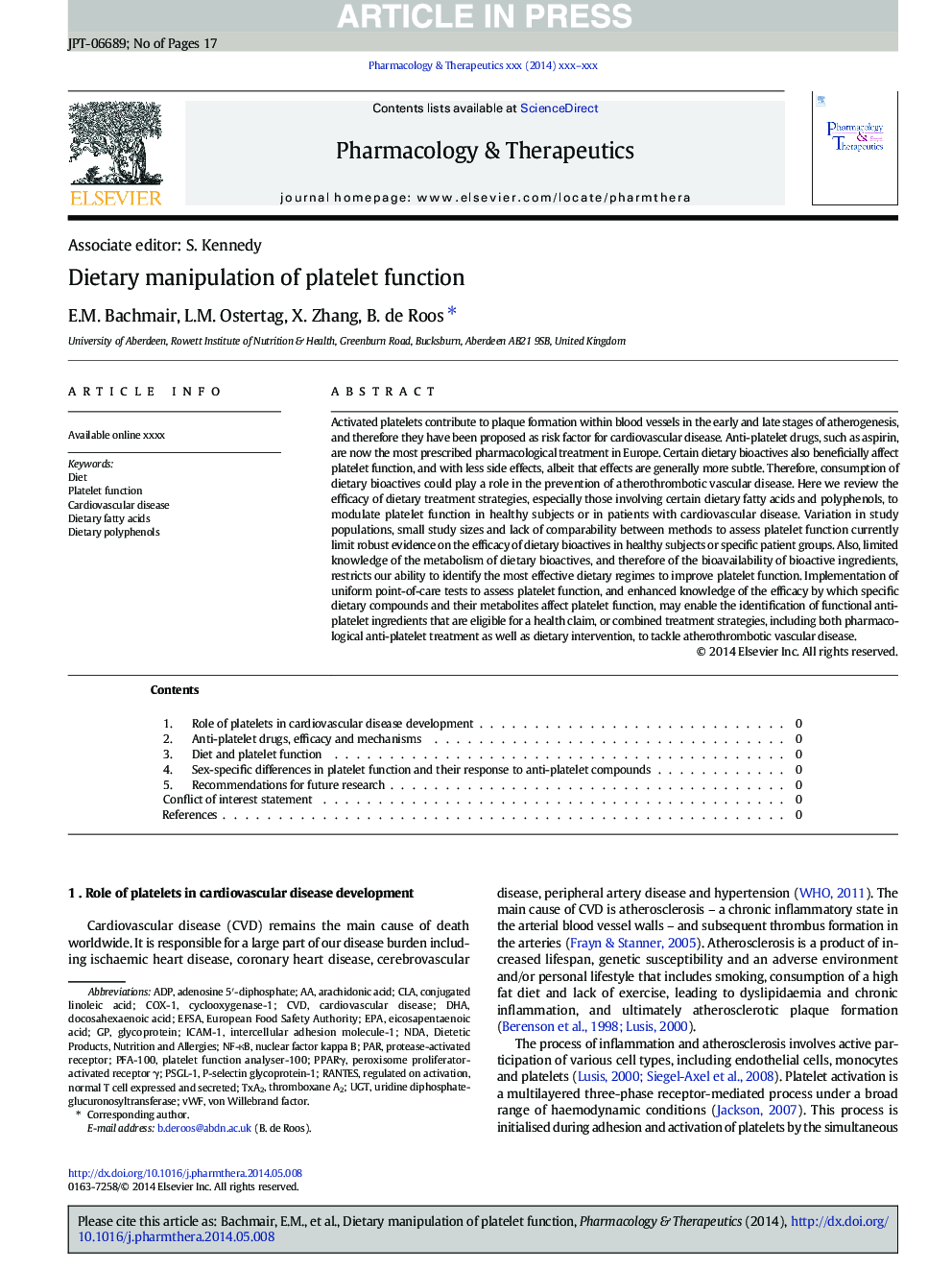| کد مقاله | کد نشریه | سال انتشار | مقاله انگلیسی | نسخه تمام متن |
|---|---|---|---|---|
| 5843994 | 1127493 | 2014 | 17 صفحه PDF | دانلود رایگان |
عنوان انگلیسی مقاله ISI
Dietary manipulation of platelet function
ترجمه فارسی عنوان
دستکاری رژیمی از عملکرد پلاکت
دانلود مقاله + سفارش ترجمه
دانلود مقاله ISI انگلیسی
رایگان برای ایرانیان
کلمات کلیدی
EPAPFA-100PSGL-1TxA2ADPEFSAPPARγCOX-1CLAvWFICAM-1NF-κBNDAUGTadenosine 5′-diphosphate - آدنوزین 5'-دی فسفاتEuropean Food Safety Authority - اداره ایمنی اروپاArachidonic acid - اسید آراشیدونیکEicosapentaenoic acid - اسید ایکوزاپنتانوئیکdocosahexaenoic acid - اسید داکوزاگزوائونیکconjugated linoleic acid - اسید لینولئیک کونژوگهDietary fatty acids - اسیدهای چرب رژیم غذاییcardiovascular disease - بیماری قلب و عروقیThromboxane A2 - ترومبوکسیان A2regulated on activation, normal T cell expressed and secreted - تنظیم شده در فعال سازی، سلول T طبیعی بیان و ترشح می شودPar - توسطDHA - دوکوساهگزائنوئیک اسیدCVD - رسوب دهی شیمیایی بخار Diet - رژیم غذاییcyclooxygenase-1 - سیکلوکوکسیژناز 1Von Willebrand factor - عامل فون ویلبراندplatelet function - عملکرد پلاکتnuclear factor kappa B - فاکتور هسته ای کاپا BRANTES - مطالبintercellular adhesion molecule-1 - مولکول چسبندگی بین سلولی -1Dietary polyphenols - پلی فنل های رژیمیGlycoprotein - گلیکوپروتئینprotease-activated receptor - گیرنده پروتئاز فعالperoxisome proliferator-activated receptor γ - گیرنده پروتئین کننده پروکسیوم فعال γUridine diphosphate-glucuronosyltransferase - یدید دی فسفات-گلوکورونوسیل ترانسفراز
ترجمه چکیده
پلاکت های فعال شده در تشکیل رگ های خونی در رگ های خونی در مراحل اولیه و پایانی آتروژنز نقش دارند و به همین دلیل آنها به عنوان عامل خطر برای بیماری های قلبی عروقی پیشنهاد شده اند. داروهای ضد پلاکت مانند آسپرین اکنون بیشترین تجویز داروهای دارویی در اروپا است. برخی از زیست فعالان رژیم غذایی نیز به طور مفصل بر عملکرد پلاکت ها و با عوارض جانبی کمتری تأثیر می گذارند، هر چند که اثرات به طور کلی ظریف تر هستند. بنابراین مصرف زیست فعالیت های غذایی می تواند در جلوگیری از بیماری آتروتروببوتی عروقی نقش داشته باشد. در اینجا، بررسی اثربخشی راهبردهای درمانی رژیم غذایی، به ویژه در مورد برخی از اسیدهای چرب رژیم غذایی و پلی فنلها، برای تعدیل عملکرد پلاکتی در افراد سالم یا بیماران مبتلا به بیماری قلبی عروقی. تغییرات در جمعیت مطالعه، اندازه مطالعات کوچک و عدم مقایسه بین روش ها برای ارزیابی عملکرد پلاکت ها، در حال حاضر شواهد قوی بر اثربخشی بیولوژیک های غذایی در افراد سالم یا گروه های خاص بیمار را محدود می کند. همچنین، دانش محدودی درباره متابولیسم زیست فعالیت های رژیم غذایی و در نتیجه قابلیت زیست پذیری مواد زیست فعال، توانایی ما را برای شناسایی موثر ترین رژیم های غذایی برای بهبود عملکرد پلاکت محدود می کند. پیاده سازی تست های مراقبت از یک واحد برای ارزیابی عملکرد پلاکت و افزایش آگاهی از اثربخشی که ترکیبات خاص رژیم غذایی و متابولیت های آنها بر عملکرد پلاکت اثر می گذارد ممکن است شناسایی مواد ضد پلاکتی عملکردی که واجد شرایط برای ادعای سلامت هستند، یا استراتژی های ترکیبی ترکیبی شامل هر دو درمان دارویی ضد پلاکت و همچنین مداخله در رژیم غذایی برای مقابله با بیماری های آتروتروببوتیک عروقی.
موضوعات مرتبط
علوم پزشکی و سلامت
داروسازی، سم شناسی و علوم دارویی
داروشناسی
چکیده انگلیسی
Activated platelets contribute to plaque formation within blood vessels in the early and late stages of atherogenesis, and therefore they have been proposed as risk factor for cardiovascular disease. Anti-platelet drugs, such as aspirin, are now the most prescribed pharmacological treatment in Europe. Certain dietary bioactives also beneficially affect platelet function, and with less side effects, albeit that effects are generally more subtle. Therefore, consumption of dietary bioactives could play a role in the prevention of atherothrombotic vascular disease. Here we review the efficacy of dietary treatment strategies, especially those involving certain dietary fatty acids and polyphenols, to modulate platelet function in healthy subjects or in patients with cardiovascular disease. Variation in study populations, small study sizes and lack of comparability between methods to assess platelet function currently limit robust evidence on the efficacy of dietary bioactives in healthy subjects or specific patient groups. Also, limited knowledge of the metabolism of dietary bioactives, and therefore of the bioavailability of bioactive ingredients, restricts our ability to identify the most effective dietary regimes to improve platelet function. Implementation of uniform point-of-care tests to assess platelet function, and enhanced knowledge of the efficacy by which specific dietary compounds and their metabolites affect platelet function, may enable the identification of functional anti-platelet ingredients that are eligible for a health claim, or combined treatment strategies, including both pharmacological anti-platelet treatment as well as dietary intervention, to tackle atherothrombotic vascular disease.
ناشر
Database: Elsevier - ScienceDirect (ساینس دایرکت)
Journal: Pharmacology & Therapeutics - Volume 144, Issue 2, November 2014, Pages 97-113
Journal: Pharmacology & Therapeutics - Volume 144, Issue 2, November 2014, Pages 97-113
نویسندگان
E.M. Bachmair, L.M. Ostertag, X. Zhang, B. de Roos,
